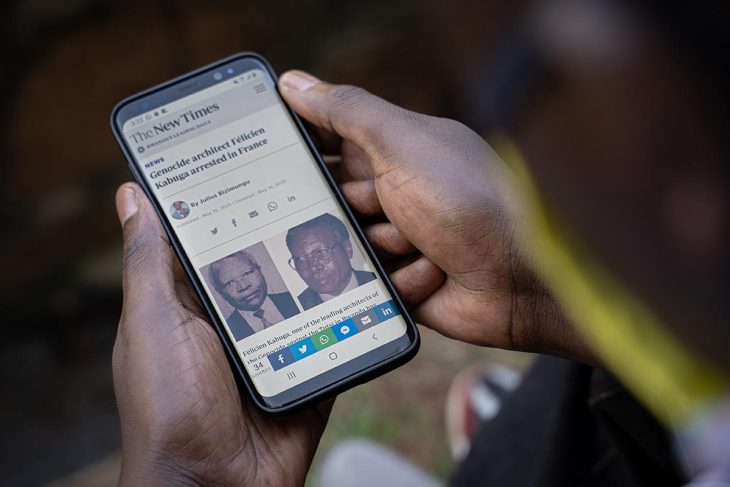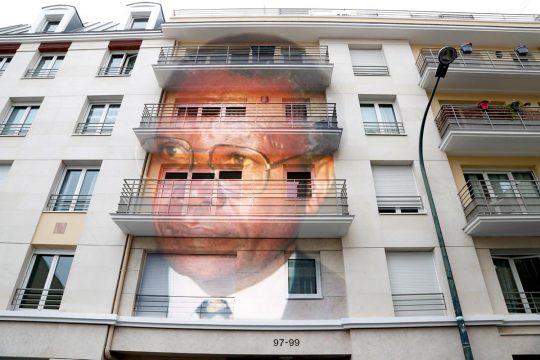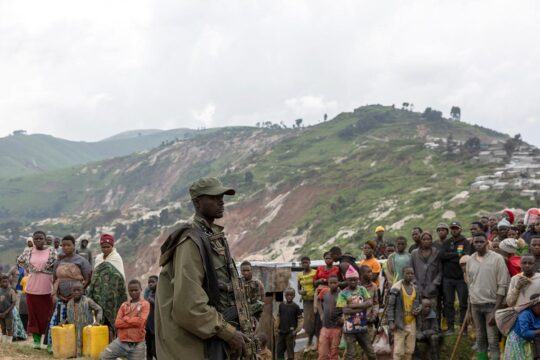Félicien Kabuga, one of the last big genocide suspects wanted for more than twenty years by the International Criminal Tribunal for Rwanda (ICTR) and then the residual Mechanism for International Criminal Tribunals (MICT), was finally arrested on May 16 this year in the Paris region of France, where he had been living under a false identity for more than a decade.
The ICTR indictments against him include the most serious crimes of genocide committed in his capacity as president from April 1993 of the Initiative Committee of RTLM radio and president of the National Defence Fund Committee from its creation in April 1994.
This arrest marks the beginning of a long judicial process. Despite the accused's great age (he is 85), his first court appearance will not take place for several weeks - see below - and the verdict is not expected for at least three years. A conviction is highly likely, but many doubts remain about how much truth will come out in a case already marked by numerous interferences from national and foreign political, judicial and even economic actors.
The prosecution’s challenges
The first challenge in this case concerns Kabuga’s 26 years on the run, many aspects of which remain opaque.
For Rwandans prosecuted or likely to be wanted by the courts, their choice of host countries depends on the security guarantees offered or that can be bought, and the local support they receive.
Here we find a number of countries and/or personalities across the world who had condemned the Rwandan Patriotic Army (RPA) attack of October 1, 1990 that plunged Rwanda into war. On April 6, 1994, when the attack on the presidential plane left the state and army without a leader, these same countries were awaiting announcement of the agreement on transitional institutions that had just been signed in Dar es Salaam. And they are the same ones that after the military victory of the RPA insurgents and the installation of autocratic rule, helped tens of thousands of Rwandans forced into exile. These refugees benefited from the understanding of states and personalities attached to the "Rwanda of before".
General political instability made exile in developing countries, particularly in Africa, uncertain. Similarly, the work of the ICTR and national justice systems gradually dismantled or weakened activist groups.
Thus choosing to settle in Europe and preferably France, not far from relatives, could paradoxically present the least risks and remain compatible with diminished resources. Indeed, Félicien Kabuga's last stage in hiding was only possible because his contacts were limited to close family.
Beyond that, it will be difficult to retrace his steps and networks or identify people who have granted protection and are unlikely to participate spontaneously in the work of truth and justice.
From allegations to evidence
Kabuga’s arrest has prompted the same comments as in 1999 when the indictment was published. There are the same descriptions of him as importer of the machetes arming the genocidaires, the "richest man in the country," of his family ties with the presidential couple, his functions at RTLM, the financing and structuring of the militias and civil self-defence. On these last two points, several trials have concluded with substantiated judgments, but a vast amount of work remains to be done, particularly on the "financing of the genocide".
As of 1995, the ICTR Prosecutor launched various financial investigations to establish the responsibilities of the ministers of finance (E. Ndindabahizi) and planning (A. Ngirabatware), Félicien Kabuga, his father-in-law, and a few others. For the Office of the Prosecutor, the "genocidal plot" must necessarily be reflected in demonstrable economic decisions. Possible evidence included the Galand-Chossudovsky report, which invoked the “planning of the genocide” through Kabuga’s import of exceptional quantities of machetes.
However, very quickly, ICTR research stumbled on the lack of tangible evidence. The archives from the ministries, including military spending, did not allow for links to the genocide to be established. The "machete thesis" proved to be very random. It was almost impossible to establish the direct and personal responsibility of the accused and to prove that the machetes were imported with the intent to kill.
In 1999, the prosecutor redirected her financial investigations to the analysis of accounting and personnel management records of public and private companies. These investigations made it possible to establish the financing mechanisms and networks that supported the structuring and training of the MRND youth movement, the Interahamwe, and that of other parties. The youth movements, created during the establishment of the multi-party system in 1991, boosted the parties’ influence and means of action a lot, strengthening their activist base. With the war, they transformed themselves into militia at the service of the politicians who financed and/or housed them (like Félicien Kabuga in Kigali), or even armed them. The investigations also demonstrated the role of public enterprises in the civil war, even if the bulk of transactions were carried out in cash, and so without material evidence.
In 2001, investigations made significant progress, thanks to access to the bank accounts of individuals and structures suspected of having organized the looting of parastatal companies, and to the budgets of the large technical ministries. Analysis of these documents made it possible to retrace the massive siphoning off of funds from development projects, parastatal establishments and ministries, for personal enrichment and consolidation of nepotistic or partisan networks, as well as the creation of front companies recycling the funds and even transfers abroad when military defeat looked certain.
Decisive evidence in key cases has been submitted to the ICTR and other foreign jurisdictions. Impunity was such that most transfers were made directly to the personal accounts of dignitaries. As a result, there was great concern in various quarters that genocide-related investigations were uncovering both old and new forms of misappropriation of public or private funds for personal or political purposes.
In May 2001, the Prosecutor's office tried to extend its investigations to the highest levels of government. A work programme was sent to the Minister of Justice with a list of names and institutions. These requests included operations carried out after the war on the accounts and assets of prominent figures of the old regime who had died, been prosecuted or "recycled" by the new authorities.
But on the day of the request, a wind of panic blew through the banks, especially in Belgium, which made their opposition known at the highest level of the Rwandan state. Investigations were refused on the grounds that they could harm "national reconciliation" and the "reconstruction of the country" because they would raise the concern of economic groups now shielded from investigation.
What will happen in the future when prosecution investigators seek such evidence in Rwanda, but also in Belgium, Switzerland, France, and elsewhere? Is it possible to hope that it has been saved?
Witness credibility
A third question concerns the credibility of witnesses.
Here we should recognize the expertise of Rwandan jurists, capable of organizing intensive sessions with selected witnesses to shape evidence that is difficult to challenge because only the authorities have full access to the field and to individuals.
But Rwanda has never renounced the use of false witnesses or even the invention of evidence. One wonders whether the National Public Prosecution Authority will dare to call RTLM host Valérie Bemeriki as a witness. Sentenced to life imprisonment in Rwanda, she has become the authorities' favourite witness in many proceedings, despite ICTR judges’ rejection of her entire testimony in the media trial which they described as "deplorable".
This did not deter Prosecutor Théogène Rwabahizi of the Genocide Fugitive Tracking Unit from drafting a lengthy statement with her on August 6, 2016, which was attached to a request for the arrest of Enoch Ruhigira, Juvénal Habyarimana's former director of cabinet. In it, Valérie Bemeriki recounts that on "April 9 or 10", on leaving the RTLM director's office, Ruhigira allegedly asked two soldiers to immediately shoot two young passers-by whom he had designated as Tutsis. However, Ruhigira had been a refugee at the residence of the Belgian ambassador since 7 April before being taken out to Europe on 12 April. The same file of the Rwandan public prosecutor's office also included various minutes of witnesses claiming to have seen him during the three months of the genocide!
If one adds to these reservations the disappearance, over time, of many witnesses and the probable destruction of crucial archives, one of the major issues at stake in the Kabuga trial is the credibility of the witnesses and the value of the evidence submitted to the judges.
To consolidate investigations, Belgian judge Damien Vandermeersch recommended in 1999 "increased control by the prosecutor" [https://genevaconference-tpir.univ-paris1.fr/article224,224-lang=fr.html ] and the introduction of the adversarial system, which would allow the defence to know the case from an early stage of the investigations. All the parties would have an interest in this, so that this final trial could serve to reveal the truth on key outstanding questions concerning the actors and the sequence of events they triggered or helped. This is certainly the Mechanism’s responsibility.
But is such an objective, with the tasks it entails and the slowness of an international tribunal, compatible with Rwandan expectations?
Truth versus rewriting history
While relations between the ICTR and Kigali were marked by a succession of crises and the credibility of international justice on the continent is often called into question, the challenge for the MICT is considerable.
For those who want to know what happened in Rwanda, it would be incomprehensible that big questions about the decision-making system, organization and conduct of the war and genocide remain unanswered.
Rwanda’s objective would seem to be a formal recognition of the "planning of the Tutsi genocide several years in advance", which no ICTR Chamber has ever been able to establish. The "genocidal conspiracy" theory (said to have been the work of President Habyarimana’s widow Agathe Kanziga, her brother Protais Zigiranyirazo, family relative Félicien Kabuga, Colonel Bagosora and others) supported by the first ICTR prosecutors was abandoned early on for lack of sufficient evidence, despite Rwanda's accusations. Its failure in this respect was confirmed by judges in the Bagosora trial and then in the acquittal of Zigiranyirazo on appeal. As for Agathe Kanziga, she was never prosecuted by the ICTR, and in 2001 Kabuga became the prosecutor's number one target.
But while a conviction for “conspiracy” for his role in RTLM remains uncertain given the media trial jurisprudence, initiating a trial of the presidential inner circle through the Kabuga case could be considered, and would offer an extension to the conviction of Kabuga’s son-in-law, A. Ngirabatware, the presidential clan’s intellectual and adviser.
Indeed, after the departure of Agathe Kanziga to France on 9 April 1994, the members of the presidential family who had not been evacuated withdrew to Gisenyi on 11 April, and were joined by others such as Félicien Kabuga. According to our sources, Agathe Kanziga, in liaison with the Méridien Izuba HQ in Gisenyi, maintained mediation activities from her Parisian exile with several African heads of state, which strengthened the diplomatic position of the interim government (IG) that presided over the genocide.
On July 3, 2020, the Paris Court of Appeals dismissed the case against RPF personalities for the plane attack of April 6, 1994. For the Rwandan authorities, this dismissal would imply that the plane was shot down by Hutu extremists, spearheaded by Agathe Kanziga. For them she would also have been, during the night of 6-7 April, commander of the killings committed by the Presidential Guard as well as of the Kigali massacres committed by the Interahamwe, before Colonel Bagosora was installed as a trainer for the IG.
Whatever the outcome, the Kabuga trial could allow Kigali to relaunch its campaign to get Agathe Kanziga, still in France, tried in Rwanda. It would be a landmark trial completing the victory of the Rwandan authorities on all the judicial and political processes that still elude them today.

Through these final trials, the Rwandan government’s priority remains to consolidate its rewriting of the tragedy, which has become the official history of the war and genocide, protected by laws on genocide denial and revisionism.
However, a trial of Agathe Kanziga in Rwanda faces obstacles that became clear in several interviews with President Paul Kagame. On April 1, 2019, he responded to Jeune Afrique, who asked if he thought he would ever get Agathe extradited:
I don't know. But even if our request is not, for one reason or another, considered, why has this woman never been bothered by the ICTR or the French justice system? Why has she never been investigated in the country where she took refuge? The facts speak for themselves."
It is true that Agathe Kanziga was never prosecuted by the ICTR. But how could the prosecutors have prosecuted Juvénal Habyarimana's widow after having refused to take up the case of the plane attack and having granted the RPF total impunity by halting investigations into its crimes?
In another statement to Jeune Afrique on July 2, 2020, Kagame expressed opposition to any reopening of the attack case as part of the final appeal before the Court of Cassation. It seems he doesn’t think that knowing who downed the plane is necessary. An official story is not written on the basis of evidence, but on the basis of balance of power.
It is one thing to organize the moral and political demonization of the presidential family and another to call loud and clear for a real trial. Such a trial would open contradictory debates on the April 6 attack, international backing, and the war crimes and crimes against humanity committed during the RPF's conquest by force of arms.
Arusha, The Hague, Kigali?
Since it seems unlikely that precise information will be obtained on Kabuga's flight and there are many witnesses to his alleged crimes in Rwanda, the possibility cannot be ruled out that the Kigali authorities will ask the MICT to relinquish the case in their favour after the French justice system definitively confirms the transfer of the accused to the MICT.
On May 28, Judge Sekule of the MICT advocated waiting for the lifting of coronavirus restrictions before making travel arrangements to Arusha, Tanzania, but added that "an appropriate alternative may be sought". Indeed, uncertainties remain about a transfer to Arusha, including the medical condition of the accused, structures to deal with Covid-19, and staff recruitment.
If these constraints continued, how could Rwanda not shift as an "appropriate alternative" after the vote of the UN Assembly of Member States resolution that “calls upon all States to cooperate with the Government of Rwanda to investigate, arrest, prosecute or extradite all remaining fugitives”? An assumption that does not exclude even Serge Brammertz, the MICT Prosecutor: "Today, there is only one option, it is the Mechanism that is competent. It is neither France nor Rwanda, unless the UN Security Council decides otherwise", he told AFP in September. Rwanda could therefore be considered an "appropriate alternative", given that a High Court has been set up for this purpose in Rwanda, that its rigorous management of Covid-19 is internationally recognized, and that the European Union has re-established direct flights to Kigali.
This would echo the arguments of the Ibuka survivors' association: "If he is handed over to Rwanda, the question of reparations could be raised," said its president, recalling that "the international judicial system has not provided for the question of reparations to be raised”.
Arusha, The Hague, Kigali? The question remains and, whatever the answer, it will not put an end to the MICT/Rwanda competition. Nevertheless, another outcome could still upset the hypotheses: that of a guilty plea. Such a procedure would be validated by the judges only after a complete and detailed hearing of the accused, committing him to tell the truth on the basis of proven facts. If this option were to be accepted by Prosecutor Serge Brammertz, it would lead to a much lighter procedure.
A long version of this article in French and a version in Kinyarwanda can be downloaded here.
André Guichaoua, Professeur des universités, Université Paris 1 Panthéon-Sorbonne.







